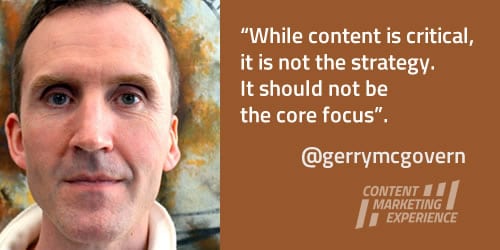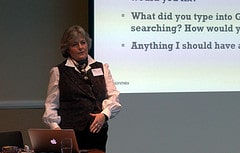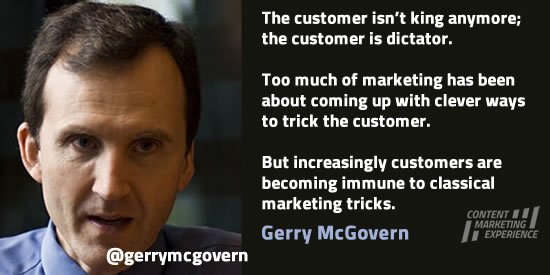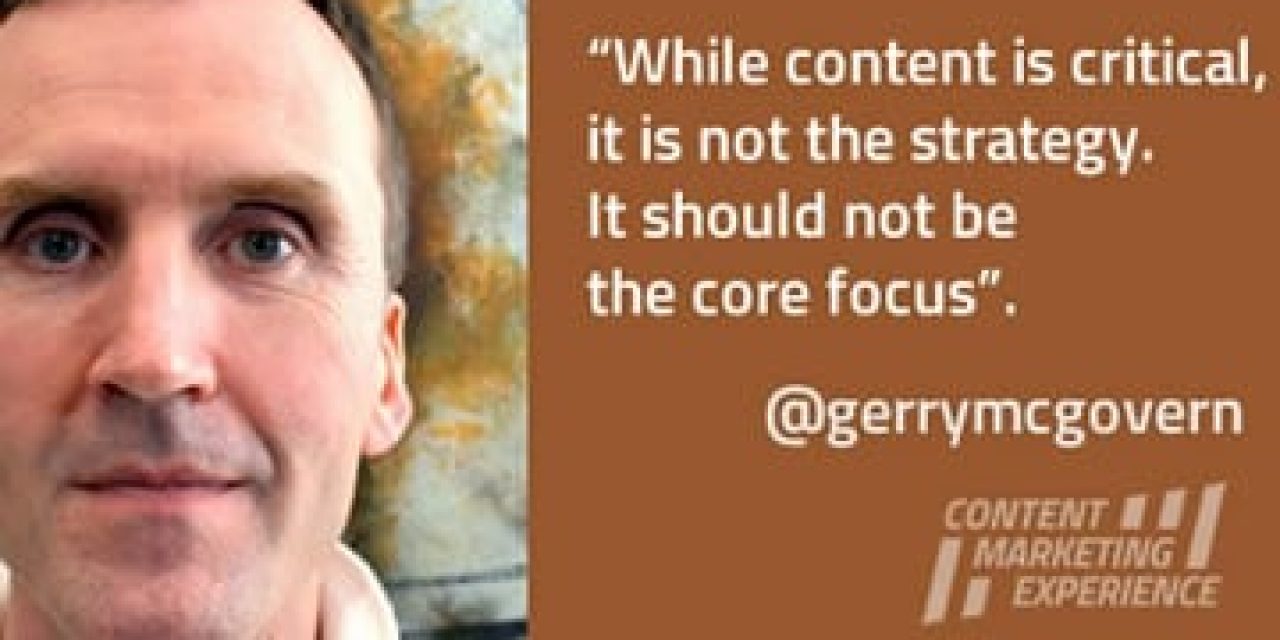
Gerry McGovern is an absolute authority regarding the online customer experience and long-time advocate of using website content, words and images that are fully about the tasks visitors want to fulfill and their intent instead of what we want to communicate on our websites. Gerry is a warrior with the mission to make people’s lives online better and thus by definition increase the conversions and reputation of brands on the Web.
That’s why we always loved the man’s views and invited him as a speaker at a Fusion Marketing Experience conference where he gave two great presentations, among others on how to improve conversion by focusing on customer top tasks.
The customer is not king as far as Gerry McGovern is concerned. He is dicator as you’ll read in this interview. No corporate speak when Gerry is around. Discover the strong opinions and extremely customer- and task-oriented views of Gerry McGovern, the man behind ‘Customer Carewords‘.
Let’s jump right in with Gerry’s views on the role of content and content strategy.
Gerry McGovern: The single most important thing I’ve learned about online marketing is that it is about paying attention. Offline marketing is about getting attention, but once someone is on your website, they know what they want to do, so your first job is to help them do what they came to you website to do as quickly and easily as possible. That’s why I talk so much about tasks. You focus on your customer’s tasks. You seek to make them easy to complete. Will you need content to do this? Sure. However, content is not the focus. Content is not the strategy. The task is the focus. The task is the strategy.
Keywords bring you to a website but carewords bring you through a website
When talking about the tasks – or intent as we call it – of website visitors and how to make them possible, you often use the term carewords. Can you explain what customer carewords are and why they are so important?
Gerry McGovern: Keywords bring you to a website but carewords bring you through a website. For example, we have done a lot of work with finding out how students choose a university. We found that concepts such as “prestigious, well recognized degree” and “advance your career” were very important to them.
Now, people will not search with these types of words, but these words become very important once you arrive at a website. These are the words I call carewords.
A few years ago we started talking about content marketing, basically using content for several marketing purposes and in different stages of the customer’s journey. What are your thoughts on that?
Gerry McGovern: The thing I’ve realized is that while content is critical, it is not the strategy. It should not be the core focus. Getting the words exactly right can make a huge difference. Over 10 years ago I presented data at airline conferences stating that “cheap flights” was 1,000 times more searched for than “low sales”. Airline executives almost laughed at me. ‘You don’t understand our industry,” they chorused. ‘We could never use the word ‘cheap’. It would hurt our brand.’
Well, today, all the airlines use “cheap flights”. But that’s not a content strategy; that’s a customer-centric strategy.

Ease of use: bring the customer in
In order to understand what people need, their tasks and what content they want, and thus improve conversion, we need to listen and measure digital footprints. What should businesses do to get a more integrated voice of the customer program that leads to better content and tangible improvements, especially now that customers are more empowered than ever before?
Gerry McGovern: The single most important thing is to observe real customers try and complete real tasks on your website. Watch people try and use your website. That is so powerful. Web marketers are like blind men trying to conduct an orchestra in New York while sitting in a taxi in Amsterdam. We have to bring the customer in, make the customer present.
It always strikes me how passionate you get when talking about the need to make it easier for people to find what they seek when, for instance, shopping. This goes both for online and offline experiences. Are businesses doing a poor job and if so, why?
Gerry McGovern: Ease of use is a tsunami ripping across the world. It is no longer a nice phrase, a nice to have. It is a vital necessity. If you don’t make it fast and easy you lose customers. Fact. The easier you make it the more customers you win. Fact. Businesses are doing an incredibly poor job because to make it easy for the customer you almost always need to make it more complex for the business. Businesses don’t want to take on the complexity of making it easy for customers. We need to develop a return on investment model for ease of use. There are huge returns but we’re not measuring them.

A few years ago you started working together with “revenue coach” Kristin Zhivago who wrote a book that basically is a roadmap to facilitate the buying process instead of the traditional view on sales. What are, according to you, the main changes in buying behavior and the customer’s journey?
Gerry McGovern: Kristin Zhivago (note: also a speaker at one of our events) is one of the smartest and nicest people I know. The Web is a buying environment rather than a selling environment. Everything is back to front. The customer is the advertiser, the marketer. In social media they are marketing themselves and in Google they are advertising. Search is really the customer advertising. When I search for “Dublin Rio flight” I am placing a small ad in Google saying that I want to fly from Dublin to Rio. So, Kristin has got it totally right. She’s focused on completing the purchase rather than making the sale. Help people to buy rather than sell to them.
The customer is dictator
In her book, “Roadmap to Revenue: How to Sell the Way Your Customers Want to Buy“, Kristin advices to involve the customer much more and really define the roadmap with him on board. Your thoughts?
Gerry McGovern: The customer isn’t king anymore; the customer is dictator. And if you don’t defend them they will leave or worse attack you with all the social media tools at their disposal. Too much of marketing has been about coming up with clever ways to trick the customer. (Hero shots are a classical example. Sometimes the customer even wants to be tricked.) But increasingly customers are becoming immune to classical marketing tricks. The customer is much more in control today, much more cynical, sceptical. The greatest skill a web marketer can acquire is empathy for their customer and one of the best ways of developing empathy is actually being with your customers.
You are not always appreciated by the website designers. “Ugly often works best”. “No Flash intros”. But obviously it’s all a matter of business goals and context. Where do you think design matters most?
Gerry McGovern: Design is different on the Web. Amazon, Twitter, Google design. Design is much more about function than visual. The way Amazon has designed its customer rating system is amazing. The purely visual has a role but it is not nearly as important on the Web, and when we go to mobile, the design needs to be even simpler, more bare, more functional. The Web is largely a functional place, a place we go to get stuff done. And yes, many of the greatest web brands are ugly and functional (Amazon, Google, Twitter, Facebook, etc., etc.)
Support is the new marketing
 You look a lot at the websites of businesses. I wonder what your view is on recent evolutions in the channels via which people can find content or interact with businesses such as email, social, etc.?
You look a lot at the websites of businesses. I wonder what your view is on recent evolutions in the channels via which people can find content or interact with businesses such as email, social, etc.?
Gerry McGovern: Social media has been around from the very first days of the Web. Email was, of course, there long before the Web. In fact, I learned much of the basics of web marketing back in 1994 on email discussion groups. So, in some ways, the Web has deepened rather than radically evolved. Web pages haven’t actually changed that much. We still search with words.
The Web reflects the rise of customer power and with the new social media tools that power has only risen. Great business websites – and businesses – are constantly adapting to the needs of customers.
Regarding content, we often talk about the informational needs of people and the words that are needed to help them find what they seek. However, from a more branding-related perspective, there is a lot of talk about storytelling, since basically many businesses share the same core values and all businesses are obsessed by word of mouth. What are your thoughts on content, storytelling and word of mouth?
Gerry McGovern: There will, of course, be a number of products where storytelling works, but for an increasing number of products the last thing the customer wants is a story. They just want the facts, the details. And they run a mile from that soft marketing language. I have heard customers complain so many times that such and such a content is “just marketing”. In other words, meaningless babble, useless waffle, so high level it’s in outer space.
People want meat today. Increasingly I see support content as the new marketing. People want to get behind the marketing jargon and see how actually does the product work; is it actually easy to install; what are customers who actually bought it saying. Support is the new marketing. Support is the new sales.

A final question: what should every marketer be doing first right now?
Gerry McGovern: Observing your customer trying to complete a real task on your website.
The message is clear: focus on the tasks, goals and customer first and always. Below you can view one of Gerry’s presentations he shared with us last year on Customer Carewords, navigation, usability and customer top tasks.






